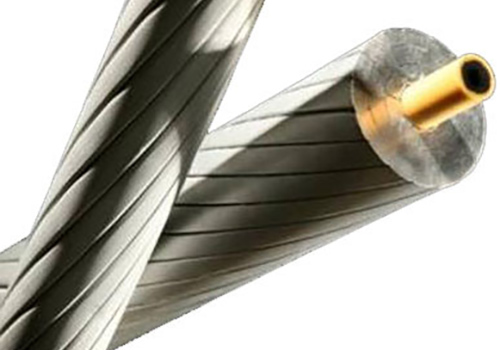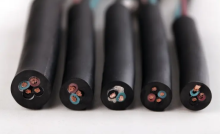Aluminum Conductor Composite Core Cable (ACCC) Advantage Introduction


At present, overhead cables are used to transport electricity over long distances. Conventional cables are mostly aluminum conductor steel reinforced (ACSR). Since the 1990s, carbon fiber composite cores (aluminum conductor composite core) have been used as the core bar of cables. ACCC has the following advantages over traditional conductors.


1. High strength and lightweight.
The tensile strength of ordinary steel wire is 1240~1410MPa, while the carbon fiber composite core of the ACCC conductor is twice the former, and its specific gravity is only 1/4 of steel. The weight per unit length of ACCC conductors of the same specification is 10%~20% lighter than conventional ACSR conductors. This allows the tower span of overhead cable to grow, reducing the number of towers by about 16% while reducing the footprint.
2. High conductivity and low transmission loss.
Under the same outer diameter, the cross-sectional area of ACCC’s aluminum strand is 1.29 times that of conventional wires. Therefore, the load capacity is increased by about 29%. Because ACCC wire does not have the magnetic loss caused by the wire material and the resistance heat effect. In addition, it has a lower operating temperature for the same load, which reduces transmission losses by about 6%. Also, because ACCC uses trapezoidal aluminum wire, its appearance is smoother than ACSR’s round aluminum wire. The surface roughness coefficient is improved, thus increasing the corona onset voltage of the wire and reducing the corona loss.
3. Low arc sag, reducing sag by more than twice.
ACCC wire has significantly low relaxation characteristics compared to conventional wire. Under high-temperature conditions, the arc sag is less than 12% of steel-core aluminum-stranded wire. It can effectively reduce the insulation space of the overhead line corridor, improve the safety and reliability of the wire operation.
4. Corrosion resistance.
ACSR’s aluminum wire and steel core due to long-term exposure to the air. The surrounding environment will corrode the metal material, thus reducing the strength of the wire and affecting the life of the wire. Carbon fiber composite core does not rust, corrosion resistance, overcoming the corrosion of galvanized steel stranded wire core. And it also avoids the electrochemical corrosion problem between the aluminum wire and galvanized steel wire when the conductor is energized. Better solve the aging problem of long-term operation of the wire, the service life is higher than the ordinary wire twice.
Recent Posts
De la cupru la fibră: Evoluția cablului
Introduction: The "Lifeline of Civilization" Across Time and Space In 1858, after five heartbreaking failures,…
Cum să înțelegeți rapid care este cablul trifazat? Preferat aici!
In the world of industrial and commercial power distribution, three-phase cables play a critical role…
Furtuni și inundații! Modul în care cablurile impermeabile protejează puterea?
Introduction In recent years, heavy rainfall and flooding have become increasingly frequent worldwide, causing severe…
Rolul și provocările industriei prin cablu în economia circulară
Introduction As sustainability becomes a global priority, industries across the spectrum are reevaluating their operations…
Cum poate industria cablurilor să îndeplinească provocarea globală a lanțului de aprovizionare?
The global supply chain is an intricate and essential network that connects manufacturers, distributors, retailers,…
Impactul energiei regenerabile asupra cererii de cablu
Introduction The global shift toward renewable energy has become a cornerstone of efforts to combat…

